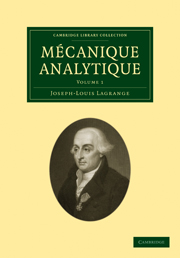
-
Select format
-
- Publisher:
- Cambridge University Press
- Publication date:
- 05 February 2015
- 20 July 2009
- ISBN:
- 9780511701788
- 9781108001755
- Dimensions:
- Weight & Pages:
- Dimensions:
- (244 x 170 mm)
- Weight & Pages:
- 0.7kg, 444 Pages
You may already have access via personal or institutional login
Book description
Joseph-Louis Lagrange (1736–1813), one of the notable French mathematicians of the Revolutionary period, is remembered for his work in the fields of analysis, number theory and mechanics. Like Laplace and Legendre, Lagrange was assisted by d'Alembert, and it was on the recommendation of the latter and the urging of Frederick the Great himself that Lagrange succeeded Euler as the director of mathematics at the Prussian Academy of Sciences in Berlin. The two-volume Mécanique analytique was first published in 1788; the edition presented here is that of 1811–15, revised by the author before his death. In this work, claimed to be the most important on classical mechanics since Newton, Lagrange developed the law of virtual work, from which single principle the whole of solid and fluid mechanics can be derived.
Contents
Metrics
Altmetric attention score
Full text views
Full text views help Loading metrics...
Loading metrics...
* Views captured on Cambridge Core between #date#. This data will be updated every 24 hours.
Usage data cannot currently be displayed.
Accessibility standard: Unknown
Why this information is here
This section outlines the accessibility features of this content - including support for screen readers, full keyboard navigation and high-contrast display options. This may not be relevant for you.
Accessibility Information
Accessibility compliance for the PDF of this book is currently unknown and may be updated in the future.


